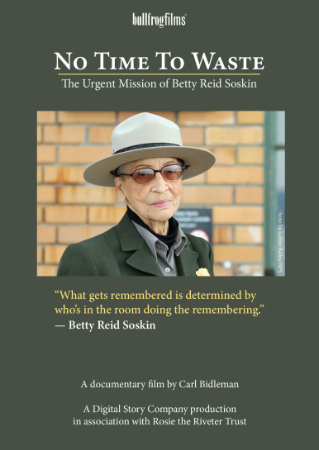
No Time to Waste: The Urgent Mission of Betty Reid Soskin 2019
Distributed by Bullfrog Films, PO Box 149, Oley, PA 19547; 800-543-FROG (3764)
Produced by A Digital Story Company Production in association with Rosie the Riveter Trust
Directed by Carl Bidleman
Streaming, 52 mins
K-General Adult
Activism; African Americans; Environmentalism
Date Entered: 03/12/2021
Reviewed by Monique Threatt, Indiana University, Herman B Wells Library, Bloomington, IN“Each of us, famous or infamous, is a role model for somebody, and if we aren't, we should behave as though we are -- cheerful, kind, loving, courteous. Because you can be sure someone is watching and taking deliberate and diligent notes. There is no greater agony than bearing an untold story inside you.” – Maya Angelou
No truer words mirror Betty Reid Soskin’s life as represented in Carl Bidleman’s documentary film, No Time to Waste. What more is there to say that hasn’t already been written about this amazing and remarkable oral historian? Betty Reid Soskin is an author, educator, community and political activist, inspirational and motivational speaker/storyteller, tour guide, and, at 99 years young, the oldest living park ranger serving in the United States.
From her humble beginnings in Detroit, Michigan, born in 1921, to her current position as a park ranger with the Rosie Riveter World War II Home Front National Historic Park in Richmond, California, Betty Reid Soskin is a human library book able to tell stories of social change within the American and African American landscapes spanning nearly four generations.
This great-granddaughter of slaves from Louisiana lends credibility and truth to the stories of the African American experience in Richmond, particularly during 1942-1945. Dismayed by the absence of their portrayal in WWII propaganda films, unions, and overall war employment, she lectures on the inclusion and contributions of African American men and women as munition handlers, and welders. As part of the planning committee to build the WWII national historic park, she makes it known that it’s also important to memorialize and pay tribute to the African American voice as well. Her commitment and involvement on the planning committee motivates the Director of National Park Services to offer her a position as a park ranger at the age of 85.
Always the advocate for social change, in 2003 at the age of 81, Betty Reid Soskin creates a blog post titled, CBreaux Speaks…after more than nine decades of crowing the sun up. Breaux being the name of her ancestors from Louisiana. She states, “maybe I’ll be worth reading because mine is a voice of hope.” She is aware of her mortality and acknowledges that she “doesn’t have time to waste. If she doesn’t get it right, she doesn’t have time to do it over.” Her oral histories eventually lead to the publication of her book, Sign My Name to Freedom: A Memoir of a Pioneering Life, published in 2018.
Celebrated at the local and national levels, she continues to be an advocate for equality for all. She is a strong opponent to the government’s move to shut down nearly 400 national parks in 2013, winning praise from locals to the White House. She campaigns relentlessly to push back against the government’s attempts which sparks national interest thus leading to a White House invitation to introduce then President Barack Obama during the National Tree Light Ceremony in December.
Talking heads include: Dan Howe (author), Marsha Mather-Thrift (Rosier the Riveter Trust), Kelli English (National Park Service), Tom Leatherman (National Park Service), Martha Lee (National Park Service), and numerous park visitors such as Christine Harris, Kelsey McKinnis and Audrey Yee to name a few.
I am reminded of the cliché that everyone has a story to tell. Indeed. I highly recommend this film for African American, Environmental, Recreation and Tourism, and Women's studies. It is a topic that is discussed so little in African American and Women’s studies, yet this documentary is an integral fabric of the American quilt.
Published and licensed under the Creative Commons Attribution 4.0 license. Anyone can use these reviews, so long as they comply with the terms of the license.